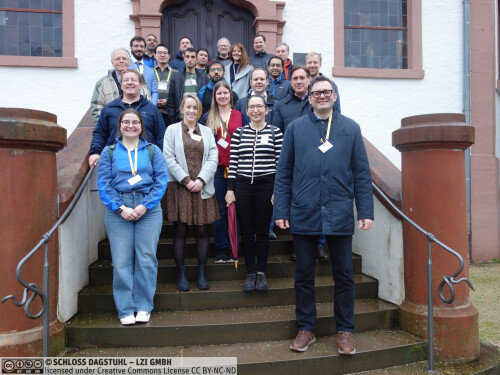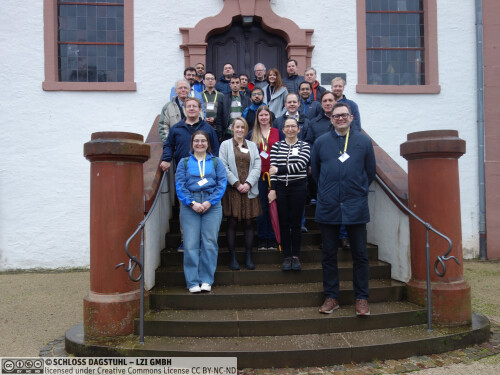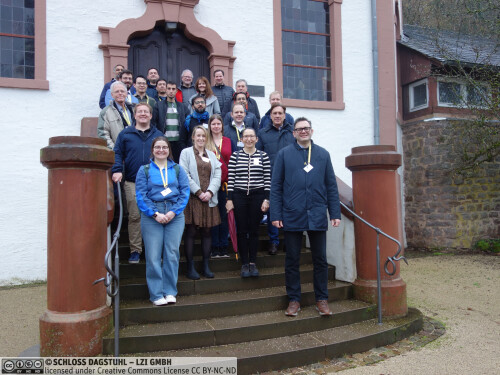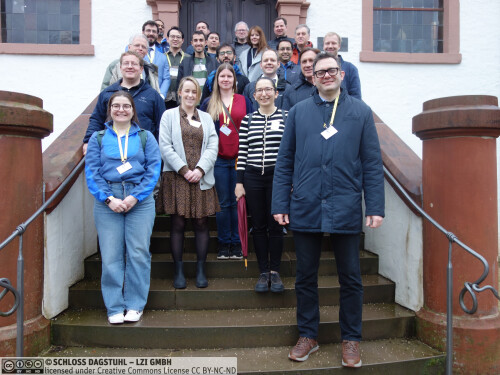Dagstuhl-Seminar 24071
Safety Assurance for Autonomous Mobility
( 11. Feb – 16. Feb, 2024 )
Permalink
Organisatoren
- Jyotirmoy Deshmukh (USC - Los Angeles, US)
- Bettina Könighofer (TU Graz, AT)
- Dejan Nickovic (AIT - Austrian Institute of Technology - Wien, AT)
- Ufuk Topcu (University of Texas - Austin, US)
Kontakt
- Michael Gerke (für wissenschaftliche Fragen)
- Jutka Gasiorowski (für administrative Fragen)
As autonomous mobility systems gain traction worldwide, ensuring their safety, robustness, and dependability has become a paramount concern for their implementation at scale. The Dagstuhl Seminar on "Safety Assurance for Autonomous Mobility" gathered experts from academia, and industry to address the critical challenges and opportunities posed by the rapid growth of autonomous technologies across various mobility domains, including automotive, aerospace, robotics, and railways. This seminar provided a much-needed platform for researchers and practitioners to exchange insights, collaborate on emerging ideas, and build a shared understanding of safety assurance in this rapidly evolving field.
Seminar Context and Structure
The seminar convened a diverse and multidisciplinary group of participants, each bringing specialized expertise in formal methods, software verification, embedded systems, and transportation safety. We believe that autonomous mobility is a field where progress cannot be just limited to academic research. The ideas and methods developed in theoretical settings build more robust applications, and the challenges faced in industrial settings guide theoretical research towards productive solutions. To reflect this drive, the group of participants was chosen to strike a balance between academia and industry, with many participants having experience in both domains. The seminar was structured around discussions in small working groups, different each day. Each group had a topic or problem to tackle, and the key challenges and state of the art solutions were shared at the end of each day to all participants of the seminar. One of the key objectives of this seminar was to bring together ideas and researchers from academic and industrial backgrounds. To this end, a sessions on Wednesday were focused on the current state of the practice being used in industrial applications, with each industrial partner sharing knowledge about their respective application fields.
Key Themes and Discussions
- Participants explored various formal methods and verification techniques designed to enhance the reliability of autonomous systems. Discussions highlighted the need to advance state-of-the-art formal verification approaches to accommodate the complexity of modern autonomous systems.
- The seminar also emphasized the importance of building resilient systems capable of functioning reliably in dynamic environments. Discussions tackled challenges related to the various modules (e.g. perception, motion planning, etc.) in autonomous mobile cyber-physical systems, considering how to incorporate robustness into the design phase and beyond.
- The specific challenges unique to each transportation sector were discussed, emphasizing tailored strategies for addressing safety assurance in automotive, aerospace, and railway systems. The cross-sectoral dialogue shed light on shared challenges and provided new perspectives that will inform future efforts.
Outcomes and Future Directions
The seminar generated a consensus on the urgent need for more research and collaboration across sectors. Participants emphasized the importance of combining expertise from different domains to address the interdisciplinary nature of safety assurance in autonomous mobility.
Moreover, the discussions underscored the potential for ongoing interdisciplinary seminars and follow-up workshops that would ensure continuous engagement among stakeholders. These future events would also provide venues for updating each other on progress, refining safety standards, and accelerating technological advancements in this field.
Overall, the seminar succeeded in creating a collaborative environment that not only identified existing challenges but also laid the groundwork for innovative solutions in safety assurance for autonomous mobility.
 Dejan Nickovic, Jyotirmoy Deshmukh, Bettina Könighofer, and Filip Cano
Dejan Nickovic, Jyotirmoy Deshmukh, Bettina Könighofer, and Filip Cano
The tremendous potential of driverless cars and other autonomous vehicles is contrasted by the growing concerns about their safety. Recent accidents have highlighted the risks autonomous vehicles pose to occupants, pedestrians, and other road users. The uptake of autonomous mobility systems relies upon public trust in the safety of these systems, which poses an inherently inter-disciplinary problem, related to multiple fields such as autonomy, machine learning, formal methods, control theory, automotive, railway, and aerospace.
This Dagstuhl Seminar aims to bring together researchers from both academia and industry in these areas. Participants will identify and discuss recent trends, open issues, industry standardization and new techniques related to the safety assurance of autonomous vehicles.
The short-term goal of the seminar is to identify specific needs that originate from the various application domains and to develop a methodology for safety assurance of autonomous vehicles. This methodology includes new methods and tools to rigorously design, test, verify, and monitor autonomous vehicles. We aim for a CACM article on "Safe Autonomous Mobility" summarizing the discussed methods as much as for new international collaborative research initiatives. The longer-term objective is to establish a standard methodology to develop and certify autonomous vehicles.
 Jyotirmoy Deshmukh, Bettina Könighofer, Dejan Nickovic, and Ufuk Topcu
Jyotirmoy Deshmukh, Bettina Könighofer, Dejan Nickovic, and Ufuk Topcu
- Houssam Abbas (Oregon State University - Corvallis, US) [dblp]
- Ezio Bartocci (TU Wien, AT) [dblp]
- Christof Budnik (Siemens - Princeton, US)
- Filip Cano (TU Graz, AT) [dblp]
- Mauricio Castillo-Effen (Lockheed Systems - Arlington, US) [dblp]
- Chih-Hong Cheng (Universität Hildesheim, DE) [dblp]
- Patricia Derler (Zoox Inc. - Foster City, US)
- Jyotirmoy Deshmukh (USC - Los Angeles, US) [dblp]
- Rayna Dimitrova (CISPA - Saarbrücken, DE) [dblp]
- Marie Farrell (University of Manchester, GB)
- Michael Fisher (University of Manchester, GB) [dblp]
- Martin Fränzle (Universität Oldenburg, DE) [dblp]
- Mahsa Ghasemi (Purdue University - West Lafayette, US)
- Radu Grosu (TU Wien, AT) [dblp]
- Rong Gu (Mälardalen University - Västerås, SE)
- Ichiro Hasuo (National Institute of Informatics - Tokyo, JP) [dblp]
- Bardh Hoxha (Toyota Research Institute North America- Ann Arbor, US)
- Taylor T. Johnson (Vanderbilt University - Nashville, US) [dblp]
- Panagiotis Katsaros (Aristotle University of Thessaloniki, GR)
- Bettina Könighofer (TU Graz, AT) [dblp]
- Thierry Lecomte (CLEARSY - Aix-en-Provence, FR) [dblp]
- Lars Lindemann (USC - Los Angeles, US) [dblp]
- Assaf Marron (Weizmann Institute - Rehovot, IL)
- Sayan Mitra (University of Illinois - Urbana Champaign, US) [dblp]
- Selma Music (Denso Automotive - Eching, DE)
- Dejan Nickovic (AIT - Austrian Institute of Technology - Wien, AT) [dblp]
- Necmiye Ozay (University of Michigan - Ann Arbor, US) [dblp]
- Giulia Pedrielli (Arizona State University - Tempe, US) [dblp]
- Doron A. Peled (Bar-Ilan University - Ramat Gan, IL) [dblp]
- Stefan Pranger (TU Graz, AT)
- Andoni Rodríguez (IMDEA Software Institute - Madrid, ES)
- Darko Stern (AVL - Graz, AT)
- Alessandro Zanardi (ETH Zürich, CH)
- Dirk Ziegenbein (Robert Bosch GmbH - Renningen, DE) [dblp]
Klassifikation
- Artificial Intelligence
- Logic in Computer Science
- Systems and Control
Schlagworte
- autonomy
- formal methods
- automotive
- railway
- aerospace





 Creative Commons BY 4.0
Creative Commons BY 4.0
